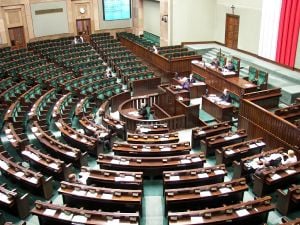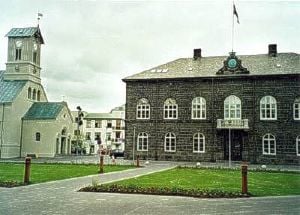Difference between revisions of "Parliament" - New World Encyclopedia
(categories added) |
(ready tag added) |
||
| Line 1: | Line 1: | ||
| + | {{ready}} | ||
| + | |||
[[Image:House_of_Representatives%2C_Parliament_House%2C_Canberra.JPG|right|thumb|350px|The House of Representatives Chamber of the [[Parliament of Australia]] in [[Canberra]].]] | [[Image:House_of_Representatives%2C_Parliament_House%2C_Canberra.JPG|right|thumb|350px|The House of Representatives Chamber of the [[Parliament of Australia]] in [[Canberra]].]] | ||
<!-- Using joined-words "A_parliament" for narrow-screen; | <!-- Using joined-words "A_parliament" for narrow-screen; | ||
Revision as of 16:00, 29 October 2007
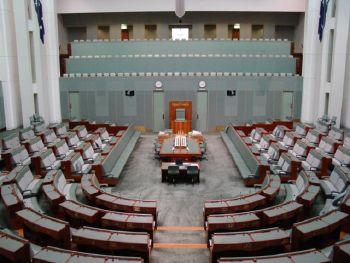
| Legislature |
|---|
|
This series is part of |
|
| Politics Portal · edit |
A parliament is a legislature, especially in those countries whose system of government is based on the Westminster system modeled after that of the United Kingdom. The name is derived from the French parlement, the action of parler (to speak): a parlement is a talk, a discussion, hence a meeting (an assembly, a court) where people discuss matters.
Parliamentary government
Legislatures called parliaments typically operate under a parliamentary system of government in which the executive is constitutionally answerable to the parliament. This can be contrasted with a presidential system, on the model of the United States' congressional system, which operate under a stricter separation of powers whereby the executive does not form part of, nor is appointed by, the parliamentary or legislative body. Typically, congresses do not select or dismiss heads of governments, and governments cannot request an early dissolution as may be the case for parliaments. Some states have a semi-presidential system which combines a powerful president with an executive responsible to parliament.
Parliaments may consist of chambers or houses, and are usually either bicameral or unicameral—although more complex models exist, or have existed (see Tricameralism).
The lower house is almost always the originator of legislation, and the upper house is usually the body that offers the "second look" and decides whether to veto or approve the bills.
A parliament's lower house is usually composed of at least 200 members in countries with populations of over 3 million. A notable exception is Australia, which has only 150 members in the lower house despite having a population of over 20 million.
The number of seats may exceed 400 in very large countries, especially in the case of unitary states. The upper house customarily has 20, 50, or 100 seats, almost always significantly fewer than the lower house (the British House of Lords is an exception).
A nation's prime minister ("PM") is almost always the leader of the majority party in the lower house of parliament, but only holds his or her office as long as the "confidence of the house" is maintained. If members of parliament lose faith in the leader for whatever reason, they can often call a vote of no confidence and force the PM to resign. This can be particularly dangerous to a government when the distribution of seats is relatively even, in which case a new election is often called shortly thereafter.
Origins of parliamentary government
- See History of Parliamentarism
England
The Curia Regis in England was a council of tenants-in-chief and ecclesiastics that advised the King of England on legislative matters. It replaced its Anglo-Saxon predecessor, the Witenagemot, a popular assembly that developed into a sort of crown council, after the Norman invasion of 1066.
William of Normandy brought to England the feudal system of his native Normandy, and sought the advice of the curia regis, before making laws. This body is the germ from which Parliament, the higher courts of law, and the Privy Council and Cabinet have sprung. Of these, the legislature is formally the High Court of Parliament; judges sit in the Supreme Court of Judicature; and only the executive government is no longer conducted in a royal court.
The tenants-in-chief often struggled with their spiritual counterparts and with the King for power. In 1215, they secured from John the Magna Carta, which established that the King may not levy or collect any taxes (except the feudal taxes to which they were hitherto accustomed), save with the consent of a council. It was also established that the most important tenants-in-chief and ecclesiastics be summoned to the council by personal writs from the Sovereign, and that all others be summoned to the council by general writs from the sheriffs of their counties. Modern government has its origins in the Curia Regis; parliament descends from the Great Council later known as the parliamentum established by Magna Carta.
The first English Parliament was formed during the reign of King Henry III in the 13th century. In 1265, Simon de Montfort, 6th Earl of Leicester, who was in rebellion against Henry III, summoned a parliament of his supporters without any or prior royal authorization. The archbishops, bishops, abbots, earls and barons were summoned, as were two knights from each shire and two burgesses from each borough. Knights had been summoned to previous councils, but the representation of the boroughs was unprecedented. De Montfort's scheme was formally adopted by Edward I in the so-called "Model Parliament" of 1295. At first, each estate debated independently; by the reign of Edward III, however, Parliament had been separated into two Houses and was assuming recognizably its modern form.
France
Originally, there was only the Parlement of Paris, born out of the Curia Regis in 1307, and located inside the medieval royal palace, now the Paris Hall of Justice. The jurisdiction of the Parlement of Paris covered the entire kingdom. In the thirteenth century, judicial functions were added. In 1443, following the turmoil of the Hundred Years' War, King Charles VII of France granted Languedoc its own parlement by establishing the Parlement of Toulouse, the first parlement outside of Paris, whose jurisdiction extended over the most part of southern France. From 1443 until the French Revolution several other parlements were created in some provinces of France.
All the parlements could issue regulatory decrees for the application of royal edicts or of customary practices; they could also refuse to register laws that they judged contrary to fundamental law or simply as being untimely. Parliamentary power in France was suppressed more so than in England as a result of absolutism, and parliaments were eventually overshadowed by the larger Estates General, up until the French Revolution, when the National Assembly became the lower house of France's bicameral legislature. (The Sénat being the upper house)
Scotland
From the 10th century the Kingdom of Alba was ruled by chiefs (toisechs) and subkings (mormaers) under the suzerainty, real or nominal, of a High King. Popular assemblies, as in Ireland, were involved in law-making, and sometimes in king-making, although the introduction of tanistry—naming a successor in the lifetime of a king—made the second less than common. These early assemblies cannot be considered "parliaments" in the later sense of the word, and were entirely separate from the later, Norman-influenced, institution.
The Parliament of Scotland evolved during the Middle Ages from the King's Council of Bishops and Earls. The unicameral parliament is first found on record, referred to as a colloquium, in 1235 at Kirkliston (a village now in Edinburgh).
By the early fourteenth century the attendance of knights and freeholders had become important, and from 1326 burgh commissioners attended. Consisting of the Three Estates; of clerics, lay tenants-in-chief and burgh commissioners sitting in a single chamber, the Scottish parliament acquired significant powers over particular issues. Most obviously it was needed for consent for taxation (although taxation was only raised irregularly in Scotland in the medieval period), but it also had a strong influence over justice, foreign policy, war, and all manner of other legislation, whether political, ecclesiastical, social or economic. Parliamentary business was also carried out by "sister" institutions, before c. 1500 by General Council and thereafter by the Convention of Estates. These could carry out much business also dealt with by Parliament—taxation, legislation and policy-making—but lacked the ultimate authority of a full parliament.
The parliament, which is also referred to as the Estates of Scotland, the Three Estates, the Scots Parliament or the auld Scots Parliament (Eng: old), met until the Acts of Union merged the Parliament of Scotland and the Parliament of England, creating the new Parliament of Great Britain in 1707.
Poland
According to the Chronicles of Gallus Anonymus, the first legendary Polish ruler, Siemowit, who began the Piast Dynasty, was chosen by a wiec. The veche (Russian: вече, Polish: wiec) was a popular assembly in medieval Slavic countries, and in late medieval period, a parliament. The idea of the wiec led in 1182 to the development of the Polish parliament, the Sejm.
The term "sejm" comes from an old Polish expression denoting a meeting of the populace. The power of early sejms grew between 1146–1295, when the power of individual rulers waned and various councils and wiece grew stronger. The history of the national Sejm dates back to 1182. Since the 14th century irregular sejms (described in various Latin sources as contentio generalis, conventio magna, conventio solemna, parlamentum, parlamentum generale, dieta or Polish sejm walny) have been called by Polish kings. From 1374, the king had to receive sejm permission to raise taxes. The General Sejm (Polish Sejm Generalny or Sejm Walny), first convoked by the king John I Olbracht in 1493 near Piotrków, evolved from earlier regional and provincial meetings (sejmiks. It followed most closely the sejmik generally, which arose from the 1454 Nieszawa Statutes, granted to the szlachta by King Casimir IV the Jagiellonian. From 1493 forward, indirect elections were repeated every two years. With the development of the unique Polish Golden Liberty the Sejm's powers increased.
The Commonwealth's general parliament consisted of three estates: the King of Poland (who also acted as the Grand Duke of Lithuania, Russia/Ruthenia, Prussia, Mazovia, etc.), the Senat (consisting of Ministers, Palatines, Castellans and Bishops) and the Chamber of Envoys—circa 170 peers acting on behalf of their Lands and sent by Land Parliaments. Also representatives of selected cities but without any voting powers. Since 1573 at a royal election all peers of the Commonwealth could participate in the Parliament and become the King's electors.
Nordic and Germanic development
A thing or ting (Old Norse and Icelandic: þing; other modern Scandinavian: ting) was the governing assembly in Germanic societies, made up of the free men of the community and presided by lawspeakers. Today the term lives on in the official names of national legislatures, political and judicial institutions in the North-Germanic countries. In the Yorkshire and former Danelaw areas of England, which were subject to much Norse invasion and settlement, the wapentake was another name for the same institution.
The thing was the assembly of the free men of a country, province or a hundred (hundare/härad/herred). There were consequently, hierarchies of things, so that the local things were represented at the thing for a larger area, for a province or land. At the thing, disputes were solved and political decisions were made. The place for the thing was often also the place for public religious rites and for commerce.
The thing met at regular intervals, legislated, elected chieftains and kings, and judged according to the law, which was memorized and recited by the "law speaker" (the judge).
Later national diets with chambers for different estates developed, e.g. in Sweden and in Finland (which was part of Sweden until 1809), each with a House of Knights for the nobility. In both these countries, the national parliaments are now called riksdag (in Finland also eduskunta), a word used since the Middle Ages and equivalent of the German word Reichstag.
Russia
The name of the parliament of Russian Federation is the Federal Assembly of Russia. The term for its lower house, Duma (which is better known than the Federal Assembly itself, and is often mistaken for the entirety of the parliament) comes from the Russian word думать (dumat), "to think." The Boyar Duma was an advisory council to the grand princes and tsars of Muscovy. The Duma was discontinued by Peter the Great, who transferred its functions to the Governing Senate in 1711.
Novgorod and Pskov
The veche was the highest legislature and judicial authority in the republic of Novgorod until 1478. In its sister state, Pskov, a separate veche operated until 1510.
Since the Novgorod revolution of 1137 ousted the ruling grand prince, the veche became the supreme state authority. After the reforms of 1410, the veche was restructured on a model similar to that of Venice, becoming the Commons chamber of the parliament. Аn upper Senate-like Council of Lords was also created, with title membership for all former city magistrates. Some sources indicate that veche membership may have became full-time, and parliament deputies were now called vechniks. It is recounted that the Novgorod assembly could be summoned by anyone who rung the veche bell, although it is more likely that the common procedure was more complex. This bell was a symbol of republican sovereignty and independence. The whole population of the city—boyars, merchants, and common citizens—then gathered at Yaroslav's Court. Separate assemblies could be held in the districts of Novgorod. In Pskov the veche assembled in the court of the Trinity cathedral.
India
In very ancient India, during the Vedic civilization, there are mentions of two Parliament-like gatherings of the Indo-Aryan kingdoms called the Sabha and the Samiti. During the time of the Buddha, many states were even tribal republics, called the Sanghas. The Sabha has been interpreted by the historians as a representative assembly of the elect—the important men of the clan, which ran day-to-day business with the king. The Samiti seems to be a gathering of all the male members of the kingdom, and probably convened only for the ratification/election of a new king. The two largely democratic institutions, which kept a check on the absolutism of the king, were given a sacred position, and have been called the daughters of the deity Prajapati in the Vedas, the holiest of all Hindu scriptures and the earliest Indo-European literature. However, these democratic institutions became weaker as republics became larger and elected chieftainship moved towards hereditary and absolute monarchy. The Sabha and the Samiti bear almost no mention in later literature. After this, India would not have any democratic legislature till the British times, culminating in its modern democratic Parliament (whose two Houses still bear the name of Sabha).
Spain
- Main article Cortes Generales
Although there are documented councils held in 873, 1020, 1050 and 1063, there was no representation of commoners. What is considered to be the first Spanish Parliament (with the presence of commoners),Cortes- was held in the Kingdom of Leon in 1118. Prelates, nobles and commoners met separately in the three estates of the Cortes. In this meeting new laws were approved to protect commoners against the arbitrarities of nobles, prelates and the king. This important set of laws is known as the "Carta Magna Leonesa"
Following this event, new Cortes will appear in the other different kingdoms: Catalonia in 1218, the Kingdom of Castile in 1250, Kingdom of Aragon in 1274, Kingdom of Valencia in 1283 and Kingdom of Navarre in 1300.
After the union of the Kingdoms of Leon and Castile under the Crown of Castile, their Cortes will be united as well in 1258. The Castillian Cortes had representatives from Burgos, Toledo, León, Seville, Córdoba, Murcia, Jaén, Zamora, Segovia, Ávila, Salamanca, Cuenca, Toro, Valladolid, Soria, Madrid, Guadalajara and Granada (after 1492). The Cortes had powers to control the king spending and taxing. But, after the defeat of the communities (Castilian War of the Communities) against the newly arrived Habsburg emperor Charles V in 1521, the Castillian Cortes lost its power and was reduced to a mere consultive entity.
The Cortes of the Crown of Aragon kingdoms remained with their power to control the king spending regarding to the finances of those kingdoms. But after the War of the Spanish Succession and the arrival of another royal house - the Bourbons - in 1714 with Philip V, their Cortes were suppressed (as were those of Aragon and Valencia in 1707, Catalonia and Balearic islands in 1714).
Parliament of the United Kingdom
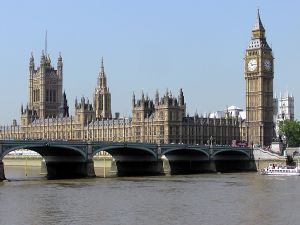
The British Parliament is often referred to as the Mother of Parliaments (in fact a misquotation of John Bright, who remarked in 1865 that "England is the Mother of Parliaments") because the British Parliament has been the model for most other parliamentary systems, and its Acts have created many other parliaments. Many nations with parliaments have to some degree emulated the British "three-tier" model. Most countries in Europe and the Commonwealth have similarly organized parliaments with a largely ceremonial head of state who formally opens and closes parliament, a large elected lower house and a smaller, upper house.
The Parliament of the United Kingdom was originally formed in 1707 by the Acts of Union that replaced the former parliaments of England and Scotland—the Irish Parliament was subsumed into the Imperial Parliament in 1801.
In the United Kingdom, Parliament consists of the House of Commons, the House of Lords, and the Monarch. The House of Commons is composed of over 600 members who are directly elected by British citizens to represent single-member constituencies. The leader of a Party that wins more than half the seats or less than half but can count on support of smaller parties to achieve enough support to pass law is invited by the Queen to form a government. Legally the Queen is the head of government and no business in Parliament can be taken without her authority. The House of Lords is a body of long-serving, unelected members: 92 of whom inherit their seats and 574 of whom have been appointed to lifetime seats.
Legislation can originate from either the Lords or the Commons. It is voted on in several distinct stages, called readings, in each house. First reading is merely a formality. Second reading is where the bill as a whole is considered. Third reading is detailed consideration of clauses of the bill. In addition to the three readings a bill also goes through a committee stage where it is considered in great detail. Once the bill has been passed by one house it goes to the other and essentially repeats the process. If after the two sets of readings there are disagreements between the versions that the two houses passed it is returned to the first house for consideration of the amendments made by the second. If it passes through the amendment stage Royal Assent is granted and the bill becomes law as an Act of Parliament.
The House of Lords is the less powerful of the two houses as a result of the Parliament Acts of 1911 and 1949. These Acts removed the veto power of the Lords over a great deal of legislation. If a bill is certified by the Speaker of the House of Commons as a money bill (i.e. acts raising taxes and similar) then the Lords can only block it for a month. If an ordinary bill originates in the Commons the Lords can only block it for a maximum of one session of Parliament. The exceptions to this rule are things like bills to prolong the life of a Parliament beyond five years. If a bill originates in the Lords then the Lords can block it for as long as they like.
In addition to functioning as the second chamber of Parliament, the House of Lords is also still the final court of appeal for much of the law of the United Kingdom—a combination of judicial and legislative function that recalls its origin in the Curia Regis. This will change in October 2009 when the Supreme Court of the United Kingdom opens.
List of parliaments
- List is not exhaustive
Contemporary national parliaments
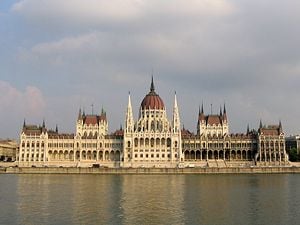
- See also: list of national legislatures
Parliaments of the European Union Member States
- European Parliament
- Parliament of Austria
- Belgian Federal Parliament
- National Assembly of Bulgaria
- House of Representatives of Cyprus
- Parliament of the Czech Republic
- Parliament of Denmark
- Parliament of Luxembourg
- Parliament of Malta
- National Assembly of the Republic of Poland
- Parliament of Estonia
- Parliament of Finland
- Parliament of France (Parlement)
- Parliament of Germany - The Bundestag
- Greek parliament
- Hungarian National Assembly (Országgyűlés)
- Parliament of Ireland - the Oireachtas
- Parliament of Italy (Parlamento Italiano)
- Parliament of Latvia
- Parliament of Lithuania
- Parliament of the Netherlands
- Assembly of the Republic (Portugal)
- Parliament of Romania (consisting of the Chamber of Deputies and the Senate)
- Parliament of the United Kingdom
- National Council of the Slovak Republic
- Slovenian Parliament
- Cortes Generales of Spain
- Parliament of Sweden
Others
- Croatian Parliament
- Parliament of Australia
- The federal (Commonwealth) government of Australia has a bicameral parliament, and each of Australia's six states has a bicameral parliament except for Queensland, which has a unicameral parliament.
- Parliament of Canada
- The federal government of Canada has a bicameral parliament, and each of Canada's 10 provinces has a unicameral parliament.
- Parliament of the Faroe Islands (Løgtingið)
- Parliament of the Fiji Islands
- Parliament of Iceland (The Althing is the oldest still-acting parliament in the world, established at Thingvellir in 930[citation needed])
- Parliament of India consisting of Lok Sabha and Rajya Sabha
- Parliament of the Isle of Man - Tynwald (Tinvaal)
- Parliament of Israel - The Knesset
- Parliament of Malaysia
- Parliament of Montenegro
- Parliament of Morocco
- Parliament of Nauru
- Parliament of New Zealand
- Parliament of Norway (Storting)
- Parliament of Pakistan
- National Assembly of Serbia (Narodna Skupština)
- Parliament of Singapore
- Parliament of South Africa
- Spanish Cortes
- Parliament of Sri Lanka
- Federal Assembly of Switzerland (Bundesversammlung, Assemblée fédérale, Assemblea federale)
- Parliament of Trinidad and Tobago
- Parliament of Nepal (recently reorganized)
- Scottish Parliament
Contemporary supranational parliaments
- Pan-African Parliament
- Central American Parliament
- Latin American Parliament
Equivalent national legislatures
- Majlis, e.g. in Iran
- in Afghanistan: Wolesi Jirga (elected, legislative lower house) and Meshrano Jirga (mainly advisory, indirect representation); in special cases, e.g. as constituent assembly, a Loya Jirga
Defunct
- Parliament of Ireland (1200–1801)
- Parliament of Southern Ireland (1921–1922)
- Parliament of Northern Ireland (1921–1973)
- People's Parliament (1940s)
Subnational parliaments
Australia
- See Parliaments of the Australian states and territories'
Belgium
In the federal (bicameral) kingdom of Belgium, there is a curious asymmetrical constellation serving as directly elected legislatures for three "territorial" regions—Flanders (Dutch), Brussels (bilingual, certain peculiarities of competence, also the only region not comprising any of the 10 provinces) and Wallonia (French)—and three cultural communities—Flemish (Dutch, competent in Flanders and for the Dutch-speaking inhabitants of Brussels), Francophone (French, for Wallonia and for Francophones in Brussels) and German (for speakers of that language in a few designated municipalities in the east of the Walloon Region, living alongside Francophones but under two different regimes)
- Vlaams Parlement ("Flemish Parliament"; originally styled Vlaamse Raad "Flemish Council") served both the Flemish Community (whose same it uses) and, in application of a Belgian constitutional option, of the region of Flanders (in all matters of regional competence, its decisions have no effect in Brussels)
- Parliament of the French Community
- parliament of the German Community
- parliament of the Walloon region
- parliament of the Brussels 'capital' region;
- within the capital's regional assembly however, there also exist two so-called Community Commissions (fixed numbers, not an automatic repartition of the regional assembly), a Dutch-speaking one and a Francophone one, for various matters split up by linguistic community but under Brussels' regional competence, and even 'joint community commissions' consisting of both for certain institutions that could be split up but are not.
Canada
- See Legislative Assemblies of Canada's provinces and territories
Denmark
- Parliament of Greenland
- Løgting
Finland
- Parliament of Åland
Spain
- See: List of Spanish regional legislatures
United Kingdom
- Scottish Parliament
- Welsh Assembly
- Northern Ireland Assembly
See also
- Parliamentary records
- Delegated legislation
- Global democracy
- History of democracy
- Inter-Parliamentary Union
- Legislation
- Parliamentary procedure
- Witan
External Links
- Scottish Scheme - The International Association of Business and Parliament. Retrieved October 29, 2007.
Credits
New World Encyclopedia writers and editors rewrote and completed the Wikipedia article in accordance with New World Encyclopedia standards. This article abides by terms of the Creative Commons CC-by-sa 3.0 License (CC-by-sa), which may be used and disseminated with proper attribution. Credit is due under the terms of this license that can reference both the New World Encyclopedia contributors and the selfless volunteer contributors of the Wikimedia Foundation. To cite this article click here for a list of acceptable citing formats.The history of earlier contributions by wikipedians is accessible to researchers here:
The history of this article since it was imported to New World Encyclopedia:
Note: Some restrictions may apply to use of individual images which are separately licensed.

